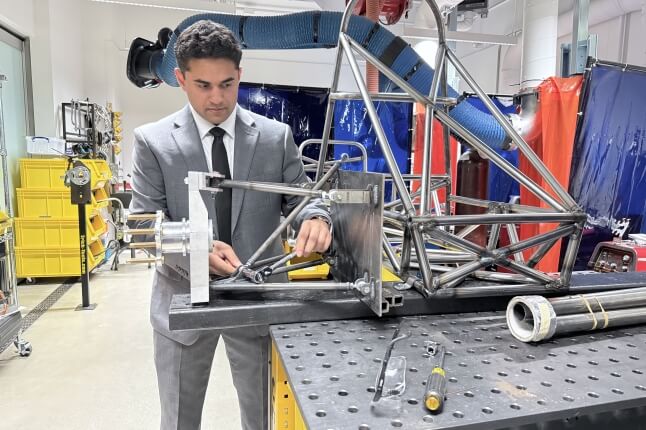News
Harvard Engineers Without Borders facilitates tough conversations, finds grateful community
The Engineers Without Borders "Failure Forum" team.
“Things always go wrong.”
That was the standout phrase in the welcome message from professional engineer Bree Carlson, mentor of the Harvard John A. Paulson School of Engineering and Applied Sciences chapter of Engineers Without Borders (EWB), and director of the student group’s inaugural “Failure Forum.”
Harvard EWB has been a force for good for many years and currently serves communities on two continents—with ongoing water catchment and distribution projects in Tanzania and the Dominican Republic. On Saturday, April 7, the members reserved the day to focus on an often hard-to-swallow topic: failure.
“We got some push-back initially on the title,” explained mechanical engineering concentrator Nicole Trenchard, S.B. ’19, EWB project lead and one of the event’s organizers. “We kicked off the day by making important people discuss their failures, which is really tough to do.”
The forum, which took place throughout Maxwell Dworkin and Pierce Hall, began with introductions from Trenchard, Carlson, Chris Lombardo, Associate Director for Undergraduate Studies in Engineering Sciences and the chapter’s faculty mentor, and Jess Wala, of Nitsch Engineering.
The day included talks by members of EWB chapters from across the Northeast, as well as a number of other professionals, from architects to state representatives, who discussed lessons learned from their work with the national organization. There were project failure case studies, discussions on “learning and leading through failure” and “building failure resiliency,” and a closing presentation from Dave Sacco of the Yale EWB chapter, titled “Why We Have to Talk About Failure."
Over the course of the afternoon, the 87 students and adult attendees related to the collapse of projects in the Philippines and Brazil due to unforeseen community and governmental disputes. They laughed over stories of technical failures, from valves breaking to pipe-layings gone wrong, and partook in meaningful discussions on responsible negotiating, operational bias, and systematic approaches to leadership.
“We wanted to make the forum attendees kind of uncomfortable to start off, then provide them with tools to feel more and more comfortable,” stated Trenchard.
McKenna Roberts, A.B. ’19, a biomedical engineering concentrator, another project lead and event organizer, was pleased by how the surrounding EWB community came together. The forum was the product of months of planning, but culminated in a novel way for students to connect with each other and network with like-minded global citizens who are also professionals in engineering fields.
Carlson summed up the achievements of the forum.
“It’s often hard to face up to the fact that we make mistakes in the fields we’re supposed to be experts in. Nonetheless, sharing mistakes, and learning from them, ensures that Engineers Without Borders members better serve our in-country communities,” she said. “It also makes us better engineers.”
Nicole Trenchard, S.B. ’19, a mechanical engineering concentrator, presents her take on failure and tools for better leadership.
Topics: Student Organizations
Cutting-edge science delivered direct to your inbox.
Join the Harvard SEAS mailing list.


